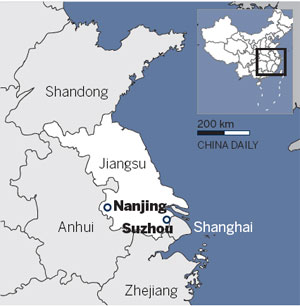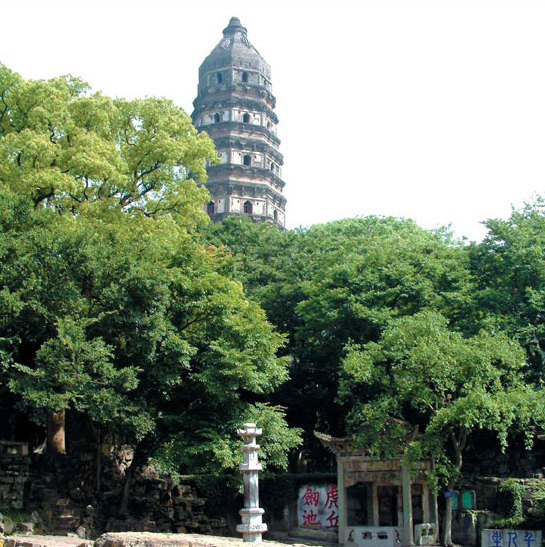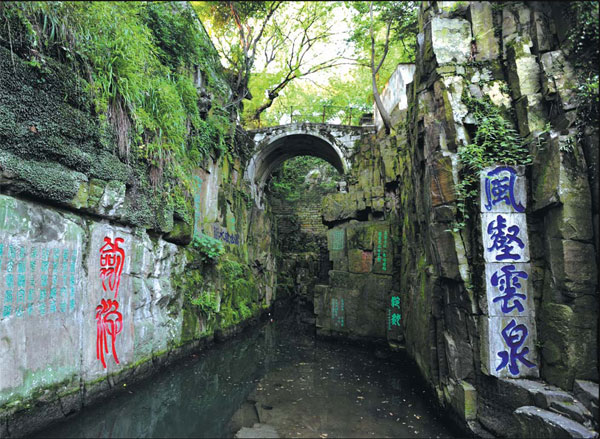Putting war to rest
Updated: 2013-03-28 07:40
By Raymond Zhou (China Daily)
|
||||||||
|
The leaning pagoda of Tiger Hill towers over the Thousand Men's Rock as if elevating the souls of the victims, or pointing to nirvana for the faithful who sat on the stony platform in legends. |
Contrary to popular belief, Suzhou's exquisite scenery embodies discordant principles and pursuits. It is the uncanny ability to blend them into harmony that created a town mellow to the extreme, Raymond Zhou reports.
On a first visit to Tiger Hill, one may well be disappointed and jump to the conclusion that Chinese poets are prone to hyperbole. "You will regret visiting Suzhou without touring Tiger Hill," wrote Su Shi, who sang the praises of so many wonderlands across China.
What's there to miss? The park, at 20 hectares or 50 acres, is not much larger than some urban recreation areas. New York's Central Park is 17 times the size. True, the pagoda on Tiger Hill is showcased on many postcards, but it stands only 48 meters high, and the hill is 30 meters at the highest, so how tall can it be all together?
Suffice to say, Tiger Hill is not known for size or height. But as a microcosm of this historical city, it embodies its quirks and charms.
Some 2,500 years ago, the local king built the biggest city in Southeast China. Well, there was no unified China then. The kingdom was named Wu, after the belligerent king who conquered places as faraway as current Hubei province. But when King He Lu led an army into modern-day central Zhejiang province, just to its south, Wu was ambushed.
He died shortly afterward from the injury. Legend says he was buried under the Sword Pond, a narrow pool of water lined with steep cliffs. This is no Grand Canyon, but rather, a movie-set-like miniature ravine complete with hanging twigs and a stone archway on top.
It is rumored that as many as 3,000 swords were buried with him. For thousands of years, it has been the fascination of tomb raiders. But they have failed to locate the exact spot.
Not far from the pond lies the reason: a circular rocky platform called the Thousand Men's Rock.
When workers finished construction of the tomb, the king regaled them with food and drink. He brought the occasion to a climax by staging a crane dance.
However, the long-necked animal, a symbol of longevity, failed to appear. Instead, the audience members held out their necks like cranes, waiting impatiently, at which point a phalanx of soldiers jumped out and cut off their heads, thus sealing the secrecy of the tomb's location for posterity.
Another origin story is more benign. It claims that a monk some 800 years later used to preach here and the stony podium could hold 1,000 listeners. Modern science explains away the brownish rock as containing iron, not remnants of blood.
That He Lu guy must have been crazy about swords. Next to the steps along the path is a boulder with a neat crevice in the middle. Not surprisingly, it was supposed to be the place where the king tested his newly forged sword. He had ordered a husband-and-wife team of blacksmiths to make a pair of the weapons, and this was what they delivered - a sword that could cut a rock in half. No wonder the names of the couple are nowadays better known to ordinary people than the king's, for example, Mogan Mountain in Zhejiang province.
This reminds me of Notung, the sword Siegmund withdraws from the giant tree in the Ring of the Niebelung. Like the Nordic tale, much of the storied past about Tiger Hill, at least the part that's 2,000 years old, is shrouded in mythology. The verses and couplets we see today are mostly from the past millennium, through which more ancient history is refracted and romanticized.
Over the years, Suzhou evolved from a military power into a hub of gentle manners and sophisticated tastes.
Taoist monks and Buddhist priests arrived to search for immortality, leaving behind a 1,600-year-old monastery (the current architecture is 140 years old), a 1,050-year-old pagoda and numerous artifacts. Literary luminaries used to hang out here as recluses, leaving behind poems, pavilions and meditations on life and nature.

There is a well in memory of Lu Yu (AD 755-804), whose Tea Bible is the epitome of the art of Chinese tea-drinking.
Suzhou produces a fine tea called Biluochun - literally, Green Snail Spring. One sip and you'll understand why this canal-strewn town has given rise to a pervasively mild disposition and why so many of its literary and artistic talents eschew bacchanalian pursuits for subtlety and refinement. You can simply imagine a group of them partaking of tea at one of the hilltop terraces or pavilions, playing chess or singing Kunqu Opera while overlooking waves of curved roof-tiles.
However, long spells of peace and tranquility were punctuated with war and revolution.
Some of the tombs are for those who rebelled against local tyranny or, in one case, one who led an uprising against exorbitant taxation. And around the time of the despotic King He Lu, a native son excelled with his wisdom about military action into The Art of War. His name was Sun Tzu and there is a pavilion in his honor.
How did a Sparta-like culture advance into quiet benevolence and subdued refinement? History books do not tell. Nor do the birds and brooks on Tiger Hill. But one saga may shed some light.
Before King He Lu died, he told his son to avenge him. The young king, Fuchai, invaded the Kingdom of Yue and captured its king and made him a slave. After showing sufficient submission, the Yue King was released. Upon returning home, he sent a femme fatale as a gift to King Fuchai, who promptly fell in love.
It turns out the beauty was a Mata Hari, who used the king's trust to alienate him from his advisers and generals. In the end, the kingdom was conquered by Yue while King Fuchai, who reigned 495-473 BC, was driven to suicide, though not on Tiger Hill.
It should be a cautionary tale for blind love, but it seems local people were set on a path for love, not war, as most of the relics in this small patch of nature show their love for a good and peaceful life.
Contact the writer at raymondzhou@chinadaily.com.cn.
|
The Sword Pond is a small-scale site awash in mystery. Photos provided to China Daily |
(China Daily 03/28/2013 page19)

 In Photos: 7.0-magnitude quake hits Sichuan
In Photos: 7.0-magnitude quake hits Sichuan
 Li Na on Time cover, makes influential 100 list
Li Na on Time cover, makes influential 100 list
 FBI releases photos of 2 Boston bombings suspects
FBI releases photos of 2 Boston bombings suspects
 World's wackiest hairstyles
World's wackiest hairstyles
 Sandstorms strike Northwest China
Sandstorms strike Northwest China
 Never-seen photos of Madonna on display
Never-seen photos of Madonna on display
 H7N9 outbreak linked to waterfowl migration
H7N9 outbreak linked to waterfowl migration
 Dozens feared dead in Texas plant blast
Dozens feared dead in Texas plant blast
Most Viewed
Editor's Picks

|

|

|

|

|

|
Today's Top News
Live report: 7.0-magnitude quake hits Sichuan, heavy casualties feared
Boston suspect cornered on boat
Cross-talk artist helps to spread the word
'Green' awareness levels drop in Beijing
Palace Museum spruces up
First couple on Time's list of most influential
H7N9 flu transmission studied
Trading channels 'need to broaden'
US Weekly

|

|









